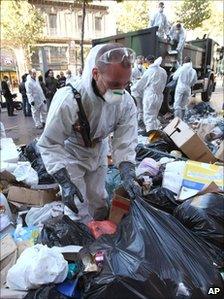Bad air and bobbing oil tankers in Marseille
- Published

The civil security service have had to help clear rubbish in Marseille
Marseille is becoming the waste bin of France. At least that is what some of the people mutter, as they stride the streets of their city.
If the wind is blowing fiercely enough off the Mediterranean - as it does at this time of year - you can just about avoid the stench of rotting fruit and veg.
But if it is not, a walk along the main shopping thoroughfare, or a visit to a cafe in the city centre can leave you with a lung full of bad air.
Growing problem
The rubbish has not been cleared off the streets for over a week now. That was when the refuse workers joined the strike here.
Great piles stand against shop windows. A woman pushes her way past the black bags and cardboard boxes that have been thrown against the Rotary Club offices.
Around one corner, two men dressed in white overalls are shovelling up some of the mess that has spread from one heap.
They work in a shop that is partly hidden behind the rubbish, and their manager is angry.
"I've been unable to open the stores for three days now," says Quentin Brunell. "I'm losing a huge amount of customers."
His patience with the strikers has run out. "I think they have their reasons, but I think there's other ways to do things than to take people hostage."
If more people start feeling like that, the unions have a problem. And they may. People talk of the rats running out from the piles of rubbish.
One shopkeeper, standing outside his electrical shop, says he is concerned about disease taking hold.
Bobbing at sea
Still, this city has not ground to a halt. Trains arrive, albeit in a reduced number, at the central station. Cars clog up the streets, as they often do. Schools are open.
In the French south, though, it is not all about fun and sun any more.
Out on the bay, beyond the windsurfers who zip across the sparkling blue waters of the Mediterranean, a flotilla bobs uselessly at anchor.
Dozens of ships lie off the coast, their captains wondering when the ports might reopen and they might be able to discharge their cargo.
This is, for now, France's biggest problem. The government says it is doing its best to break the blockade that is preventing millions of gallons of fuel getting to shore.
Killing time: a bus driver plays with a ball at the entrance to a bus depot blocked by union members
And on land, supplies are running low. You can see that at the petrol stations. Many are closed.
Petrol hunt
Along the highway that runs out of Marseille, some forecourts are empty, others have short queues through the day. There does not appear to be any panic buying, but people are filling up when they can.
"C'est plein," said a woman, with a smile, as she topped off her tank at one station that still had petrol. "It's full."
Gilles Pravon, who works in a bank, is also filling up his car. In his part of Marseille, there is no more fuel.
"You've got to look for it. You have to drive around, but there are still some pumps working."
The station manager - who did not want to be named - said the petrol at his forecourt would probably not last the rest of the day.
Bad for business, then, these strikes?
"For the company, yes, they lose money," he replied. For him though, they are not. He supports the unions.
"We'll die before we reach 67," he said, referring to the new age at which the government wants to start paying pensions. "Work is just too hard."
- Published21 October 2010
- Published10 November 2010
- Published20 October 2010
- Published20 October 2010
- Published20 October 2010
- Published20 October 2010
- Published19 October 2010